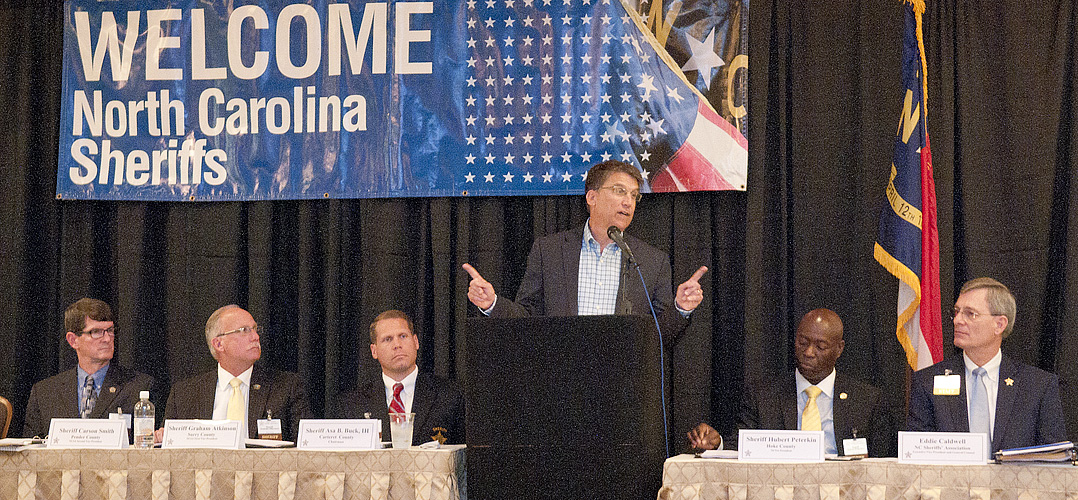Finding money for state beach renourishment projects will be more difficult after the federal government announced it won’t lease North Carolina’s offshore waters for oil and gas drilling, North Carolina Governor Pat McCrory told reporters following a speech before the state’s sheriffs Monday in Wrightsville Beach.
With the 2016 legislative “short session” scheduled to start today, McCrory said that he was ready to work with the legislature to find a dedicated state funding source for beach renourishment, though he said the revenue for offshore drilling would have been an ideal source of funding for beach renourishment projects.
“It’s very important for travel and tourism,” McCrory said on beach renourishment. “I was hoping to put future revenue from gas exploration into beach renourishment. That would have been a great source for revenue for that but unfortunately the Obama administration has put a stop to that.”
McCrory was in Wrightsville Beach to speak during the N.C. Sheriffs’ Association spring meeting at the Holiday Inn, where he touted his administration’s record on public safety, defended parts of the controversial House Bill 2 and even shared some childhood family memories of Wrightsville Beach.
In addressing the law enforcement audience, McCrory said that his administration has funded grants for body cameras, closed crime-ridden alcohol establishments, was working to keep mobile phones out of state prisons and to raise pay for correctional offices.
However, he said one of the most pressing issues facing both the law enforcement community and the state were the problems created by mental-health issues and addiction.
“It’s one of the most serious problems of the state,” he said. “It’s a problem that doesn’t have community barriers.”
He said jails and prisons are often where people with mental health issues and problems with addiction end up, which don’t offer the support to help break the cycle. He also said underage drinking and drug use contribute to mental-health problems later in life.
“Kids who have problems drinking and abusing drugs will face higher chances that they end up in the mental-health system,” McCrory said.
McCrory also brought up the “elephant in the room” by reiterating his positions on HB2. The bill, passed in March by a special session of the legislature, addressed several issues of local authority and civil rights, but is primarily known for its reversal of a Charlotte ordinance regarding transgendered use of bathroom and changing facilities.
“I think it was the right thing to do,” McCrory said of the bill’s bathroom provision, which he said protected private business from interference by the Charlotte City Council. In his closing, McCrory cited the state’s drop in unemployment to 5.5 percent, saying it was one of the best economic turnarounds in the nation.
“North Carolina is still strong, but we’re also going to stand for common-sense principles,” McCrory said, which drew a standing ovation from the law enforcement audience.
Several state legislators introduced a full repeal of HB2 on Monday, to which McCrory told reporters: “It’s not going to happen.”
However, McCrory told the sheriffs’ association that the state legislature should correct one part of the legislation that ended civil rights claims in state courts, a point he had previously made but emphasized several times on Monday.
McCrory also shared a few childhood memories of his father, who owned a sailboat docked by the Blockade Runner. The family spread their father’s ashes in Banks Channel.
“Every time I come here, I go by the sand near the dock and send him a little note,” McCrory said. “Wrightsville Beach is very special to me and my family. He loved to watch the sunset here.”
email [email protected]




